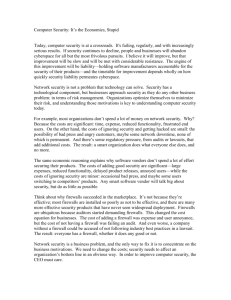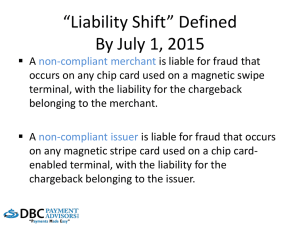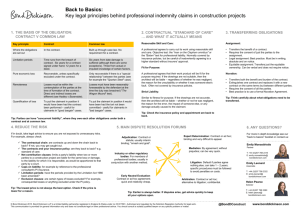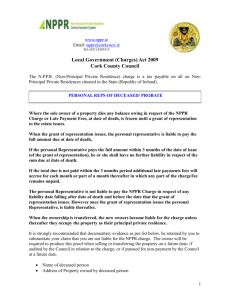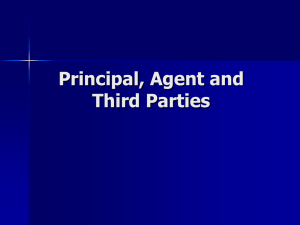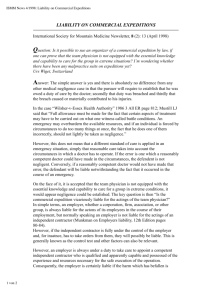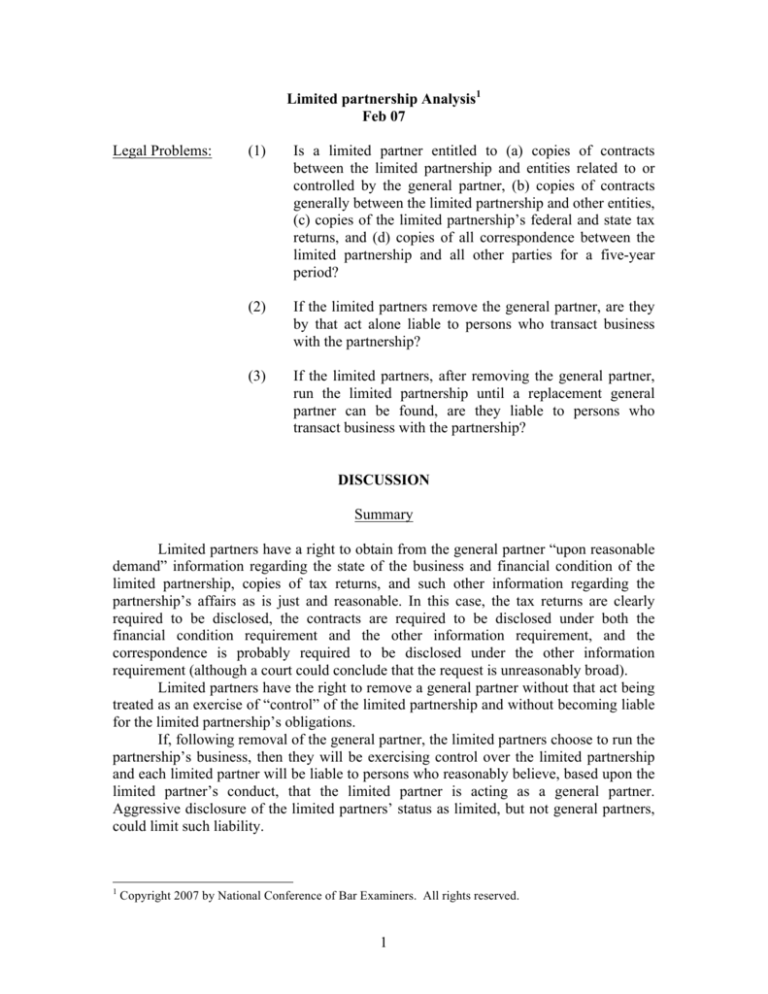
Limited partnership Analysis1
Feb 07
Legal Problems:
(1)
Is a limited partner entitled to (a) copies of contracts
between the limited partnership and entities related to or
controlled by the general partner, (b) copies of contracts
generally between the limited partnership and other entities,
(c) copies of the limited partnership’s federal and state tax
returns, and (d) copies of all correspondence between the
limited partnership and all other parties for a five-year
period?
(2)
If the limited partners remove the general partner, are they
by that act alone liable to persons who transact business
with the partnership?
(3)
If the limited partners, after removing the general partner,
run the limited partnership until a replacement general
partner can be found, are they liable to persons who
transact business with the partnership?
DISCUSSION
Summary
Limited partners have a right to obtain from the general partner “upon reasonable
demand” information regarding the state of the business and financial condition of the
limited partnership, copies of tax returns, and such other information regarding the
partnership’s affairs as is just and reasonable. In this case, the tax returns are clearly
required to be disclosed, the contracts are required to be disclosed under both the
financial condition requirement and the other information requirement, and the
correspondence is probably required to be disclosed under the other information
requirement (although a court could conclude that the request is unreasonably broad).
Limited partners have the right to remove a general partner without that act being
treated as an exercise of “control” of the limited partnership and without becoming liable
for the limited partnership’s obligations.
If, following removal of the general partner, the limited partners choose to run the
partnership’s business, then they will be exercising control over the limited partnership
and each limited partner will be liable to persons who reasonably believe, based upon the
limited partner’s conduct, that the limited partner is acting as a general partner.
Aggressive disclosure of the limited partners’ status as limited, but not general partners,
could limit such liability.
1
Copyright 2007 by National Conference of Bar Examiners. All rights reserved.
1
Point One (40-50%)
A limited partner is absolutely entitled to copies of tax returns and is entitled to such
copies of contracts and correspondence as is just and reasonable.
Under the Revised Uniform Limited Partnership Act (RULPA), a limited partner
has a right to “inspect and copy” partnership records that are required to be kept pursuant
to § 105 of the Act, and, in addition, to obtain from the general partner “upon reasonable
demand”:
“true and full information regarding the state of the business and
financial condition of the limited partnership,” RULPA § 305(2)(i);
“promptly after becoming available, a copy of the limited partnership’s
federal, state, and local income tax returns for each year,” RULPA §
305(2)(ii); and
“other information regarding the affairs of the limited partnership as is
just and reasonable.” RULPA § 305 (2)(iii).
In some jurisdictions, the reasonableness of a demand will depend, in part, on the
purpose for which the limited partner is seeking disclosure. See, e.g., Madison Ave. Inv.
Partners, LLC v. America First Real Estate Inv. Partners, LP, 806 A.2d 165 (Del. Ch.
2002). Where, as here, the limited partner has substantial reason to suspect
mismanagement of the limited partnership and wishes to obtain partnership documents to
investigate the matter, the limited partner has a right to access those documents. Id.;
Somerville S Trust v. USV Partners, LLC, 2002 WL 1832830 (Del. Ch. 2002).
Baker probably acted improperly in refusing to provide information in response to
Tim’s request for “copies of contracts between the limited partnership and entities related
to or controlled by the general partner.” This request should be covered under the first
subsection of the Act because such information relates to the “business and financial
condition of the limited partnership.” In addition, where there is a suggestion that a
general partner is engaged in self-dealing, a limited partner’s request for specific
information that would confirm or disprove that suggestion is surely “just and
reasonable.”
Tim’s demands for “copies of contracts generally between the limited partnership
and other entities” are also probably covered under the first and third subsections for the
same reasons. Such information is potentially relevant both to the general “business and
financial condition” of the partnership and to the possibility that Baker has been selfdealing.
The request for copies of the limited partnership’s federal and state tax returns is
specifically covered under the second subsection of the statute. In addition, tax returns
are documents that the limited partnership is required to keep and that a limited partner
may inspect and copy at any time. RULPA § 305(2)(ii).
2
Tim’s request for “copies of all correspondence between [the limited partnership]
and any other parties for the past five years” may go too far. This request must be
honored, if at all, only if the request is “just and reasonable” under the third subsection of
the statute. Whether a demand for copies of all correspondence is “just and reasonable” is
certainly debatable. Under the circumstances, Tim would claim that it is a reasonable
demand that would provide information useful in determining whether Baker was
properly managing the business. Baker would claim that the request goes far beyond what
is reasonable, and is essentially an effort to delve into all the files of the business on a
fishing expedition for evidence of wrongdoing.
Point Two (20-30%)
Limited partners are not liable as general partners simply for removing a general partner.
A limited partner is generally not liable for the obligations of a limited
partnership. RULPA § 303(a). See, e.g., Zeiger v. Wilf, 755 A.2d 608 (N.J. Super. App.
Div. 2000). However, a limited partner can become so liable if “in addition to the
exercise of his [or her] rights and powers as a limited partner, he [or she] participates in
the control of the business.” RULPA § 303(a). Thus, the question as to whether the
limited partners would be liable for partnership obligations were they to remove Baker as
general partner would be resolved by determining whether the act of removing the
general partner would be “participat[ion] in the control of the business.” Id.
Because of the inherent “difficulty of determining when the ‘control’ line has
been overstepped,” RULPA (and the parallel laws of most states) specifically enumerates
certain activities in which a limited partner may engage “without being deemed to have
taken part in control of the business.” § 303(b), official cmt. This so-called “safe harbor”
list of activities that do not constitute the exercise of control provides specifically that a
“limited partner does not participate in the control of the business” for purposes of
incurring liability under § 303(a) “solely by . . . proposing [or] voting [on the] . . .
removal of a general partner.” § 303(b)(6)(v). Thus, the limited partners in Astoria may
remove Baker as general partner without incurring liability for the limited partnership’s
obligations.
In states that have adopted the 2001 Uniform Limited Partnership Act, the
situation is even clearer. Limited partners are “not personally liable, directly or indirectly,
by way of contribution or otherwise, for an obligation of the limited partnership solely by
reason of being a limited partner, even if the limited partner participates in the
management and control of the limited partnership.” 2001 UNIF. LTD. P’SHIP ACT § 303.
The new Act provides the limited partners a “full, status-based liability shield” akin to the
protection given corporate shareholders. Id., official cmt.
Point Three (20-30%)
Limited partners who participate in the control of the business can be held liable for the
obli-gations owed by the limited partnership, but only to those persons who transact
business with the limited partnership in the reasonable belief that the limited partner is a
general partner.
3
Limited partners can become liable for the obligations of the limited partnership if
they participate in the control of the business in ways not within the safe harbor
exceptions in RULPA § 303(b). In particular, Tim’s suggestion that Tim, Uma, and
Vivian jointly “run the limited partnership” after removing Baker from the role of general
partner appears to contemplate a degree of involvement in the business of the partnership
that exceeds what is permitted by any of the safe harbor exceptions. Moreover, the facts
suggest that this management and control of the business would necessarily constitute
“participat[ion] in the control of the business,” as the removal of Baker would leave no
one but the limited partners in control.
Participation in the control of the business can make a limited partner liable for
the obligations of the limited partnership, but that liability extends only to “persons who
transact business with the limited partnership reasonably believing, based upon the
limited partner’s conduct, that the limited partner is a general partner.” RULPA § 303(a).
Thus the limited partners could attempt to limit their liability when running the business
by giving all the parties with which the limited partnership does business notice that they
are limited, not general, partners. See, e.g., Folgers Architects, Ltd. v. Kerns, 612 N.W.2d
539, 550-51 (Neb. Ct. App. 2000), rev’d in part and aff’d in part on other grounds, 633
N.W.2d 114 (Neb. 2001).
In some jurisdictions, however, liability could be imposed, even without thirdparty reliance, if “a limited partner’s control activities are so extensive as to be
‘substantially the same as’ those of a general partner.” Zeiger v. Wilf, 755 A.2d 608, 618
(N.J. Super. App. Div. 2000). In these jurisdictions, Tim, Uma, and Vivian would be
well-advised to make their limited role clear and to search diligently for a replacement
general partner to make clear that their temporary control did not amount to taking on a
role “substantially the same” as that of a general partner.
As noted earlier, the 2001 Uniform Limited Partnership Act “renders the control
rule extinct.” 2001 UNIF. LTD. P’SHIP ACT § 303, official cmt. Under this Act, Tim, Uma,
and Vivian would have no liability for partnership obligations even if they participated
directly in the management and control of the limited partnership.
4

